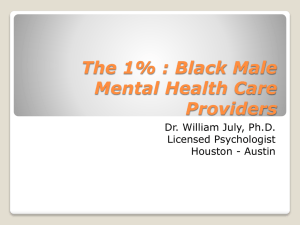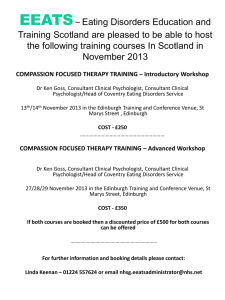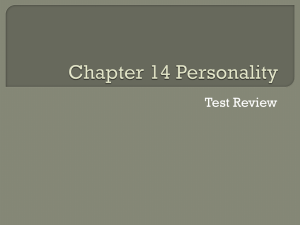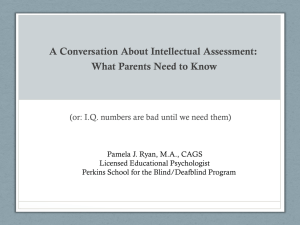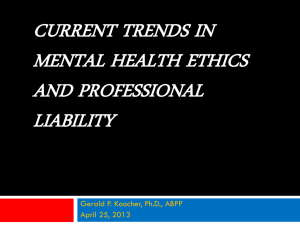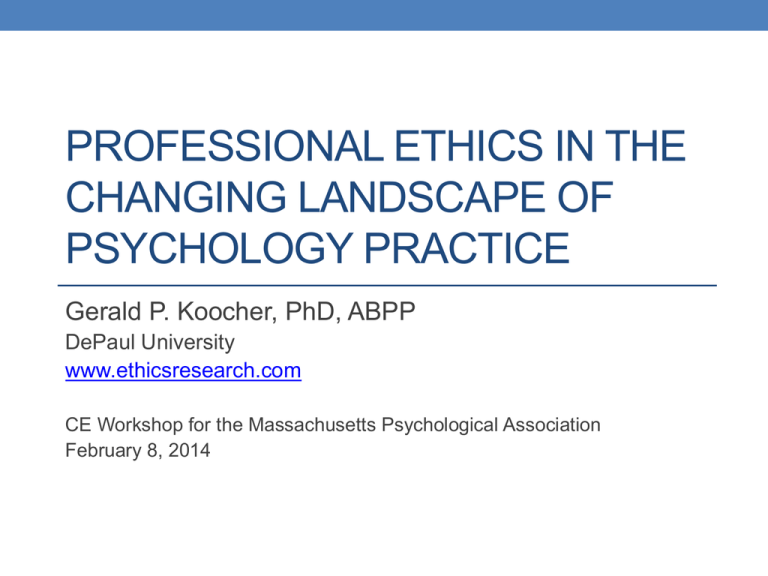
PROFESSIONAL ETHICS IN THE
CHANGING LANDSCAPE OF
PSYCHOLOGY PRACTICE
Gerald P. Koocher, PhD, ABPP
DePaul University
www.ethicsresearch.com
CE Workshop for the Massachusetts Psychological Association
February 8, 2014
Workshop Goals
• Review the risk profile of your practice in context of
•
•
•
•
frequent bases of complaints to licensing boards and
ethics committees.
Understand ethical problems associated with practice in
the health care system, clinical supervision, and complex
multiple role situations.
Determine how to plan for adequate risk coverage when
working in organizations and health care systems.
Understand how to avoid ethical problems related to
unproved or quack treatments in an era of evidencebased practice.
Formulate a plan of how to respond to an ethics or
licensing board inquiry.
• Who gets in trouble and why?
• Assessing and reducing risk of ethical
complaints.
Copyright G. P. Koocher (2013)
4
Risks Among American Insurance Trust
Policy Holders in 2011-13
• Estimated odds of a licensing board
complaint
• 0.58% (.0058) up from 0.2% in 2004
• Estimated odds of a civil law suit
• 0.35% (.0035) up from 0.1% in 2004
Data from the American Insurance Trust
•
•
•
*= 1st instance of
category
After 2011, the carrier
used sexual abuse/sexual
relationship description
on all claims (without
exception) where there is
allegation of sex or
romantic relationship,
even if there were other
boundary violations, like
gifts exchanges, etc.
claimed.
Up until 2011 the dual
role/boundary
violations category
could have involved
sex, but those after
2011 do not.
WHO GETS IN TROUBLE
AND WHY?
Most Common Litigation Triggers
• Improper care/evaluation
• Credit/billing impropriety
• Non-sexual dual relationship/boundary
violations
• Suicides
• Sexual abuses - dual relationship/boundary
violations
• Employment practices
Significant Claims and New Issues
Boundary Violations
Suicide
Homicide
Wrongful
death
Improper
treatment
Dual Relationship
Billing – Medicare Investigations
Copyright/Trademark Infringement (e.g.,
website images and music)
“improper punishment”-This claim alleges that
the psychologist had a 6 year old boy do
pushups for misbehaving.
Some things don’t change
• Want to cut your risk of an
“adverse incident” by 95%?
• Don’t engage in sexual with current
or former clients or their relatives.
• Don’t do anything that someone
might mistake for a “forensic
assessment,” without adequate
training, informed consent, and
thorough data collection.
• Don’t switch roles in a professional
relationship without well
documented consent by all parties.
Psychologist accused of sexual
assault on a client
• http://www.coloradoconnection.com/news/story.aspx?id=8
44852#.UO2f0HddB8F
COLORADO SPRINGS, COLO. -- A licensed psychologist has
been arrested on the charge of Sexual Assault on a Client by a
Psychotherapist, according to Colorado Springs Police.
Dr. Janice Husted was arrested on the charge after a police
investigation. A young man told police that a sexual relationship
developed between him and Husted, his psychologist.
Police said the man was assigned to receive counseling related
to his combat deployments during the summer of 2010. The
sexual relationship, according to what the victim told police,
started in Aug. 2011 and continued until Oct. or Nov. 2011. The
man said the psychologist told him on several occasions that
they had to be careful to not appear that they were on dates,
police said.
Police said the man told the psychologist he did not want to have
a secret relationship but she said they couldn't have an open
relationship until two years passed. After saying he did not
want to wait two years, the psychologist ended the relationship,
police said.
Sexual Assault on a Client by a Psychotherapist is a Class 4
Felony.
Barter counseling for bathroom repair (NE Grand Rapids )
Reply to: sale-948491022@craigslist.org
Date: 2008-12-07, 12:09PM EST
• “My husband is a capable and effecive counselor,
licensed...but he is not good at home repairs/construction. I
will trade his expertise for your time with him as a counselor if
you can help us with tub and tile repair and plumbing. We had
a termite problem that we fixed but the place needs a new
floor and other stuff...if you are struggling with depression or
bipolar, he is your man...maybe your spouse, child, etc. He is
truly an excellent counselor. We have our own non-profit and
give to others without charging so our financial situation is
limited, but looking to trade! thanks.”
Location: NE Grand Rapids
PostingID: 948491022
Personal Risk Assessment
Consider:
• Patient Risk Characteristics
• Situation or Contextual Risk
• Potential Disciplinary Consequences
Modified by:
• Therapist’s “Personal Toolbox of
Skills”
Patient Risk Characteristics
• Nature of Problem
• History
• Diagnosis and Level of Function
• Expectations
• Therapeutic readiness
• Financial Resources Including Insurance Coverage
• Litigiousness/court involvement
• Social Support Network
Situational Risk Factors
• Nature of relationship
• Therapeutic alliance
• Real world consequences
• Setting
• Rural versus urban
• Solo practice versus institutional practice
• Type of service requested
• CBT
• Family therapy
• Forensic Evaluation
Therapist’s personal toolbox of skills
• Psychological makeup/personal
issues
• Personal and professional stress levels
• Training background/qualifications
• Experience
• Resources
• Consultation
• Access to other providers
• Involvement with professional groups
So what should I do?
• Know the ethical and legal standards that apply.
• Pay attention to practice guidelines.
• Provide comprehensive informed consent.
• Conduct a conservative evaluation of your competence
with clinical populations and activities:
• Intellectual competence
• Technical competence
• Emotional competence
Belaboring The obvious?
Communicating by Text: example 1
• “Some of my adolescent patients are inclined to
sometimes touch base with me during the day via text
messages. It's usually pretty intermittent, (i.e., the text
conversations are not lengthy or detailed, just brief checkins). Clinically, this seems appropriately supportive to me,
but I wonder about the ethical side of it vis-a-vis
confidentiality. I never use my name in the text messages,
but they may have my full name entered into their phone
which would then show up on their screen. I will be
interested to hear your thoughts about this.”
Communicating by Text: example 2
• “A variation on this occurred when I treated a young adult
with a flying phobia. She had to travel by plane with
several colleagues and so we worked through a
graduated desensitization treatment plan. Before the
actual trip she asked me to text with her while she was in
the airport to get some surreptitious coping support during
the most anxiety-provoking part of the intervention. I did
this and it seemed to help her get through the experience
successfully. But, again, I wondered about possible ethical
violations. Thank you for considering this scenario as
well.”
Ask yourself
• How will doing this aid the client?
• Empathic connection?
• Support between sessions?
• What hazards does this pose for the client?
• Confidentiality?
• Dependence?
• What hazards does it pose for the practitioner?
• Unrealistic client expectation?
• Clear limitations?
• Standard of care?
The “Crisis Text”
• What is the “crisis.”
• Is a text message, Skype, phone call,
enough?
• What is the response expectation?
• What are the patient’s circumstances
Case 1.1
• Ms. Smith, a 32 year old mother of 2, seeks treatment
because of distress (including nightmares) related to
a chronically disabled child.
• During session 3 she expresses anxiety about
upcoming testimony in a licensing hearing against a
former therapist who reportedly made sexually
suggestive phone calls to her.
• During session 4 she mentions for the first time that
she is concurrently in psychoanalysis (of ten years
duration) and that she once impulsively removed all
her clothes during a session.
Citation
• Your diagnosis and next steps?
• Geist, Richard A.(2009) 'Empathy,
Connectedness, and the Evolution of Boundaries
in Self Psychological Treatment', International
Journal of Psychoanalytic Self Psychology, 4: 2,
165 — 180.
• DOI: 10.1080/15551020902730273
• URL: http://dx.doi.org/10.1080/15551020902730273
High Risk Patients
Patients
who organize their internal
object world into hated and adored
objects
• Borderline Personality Disorder
• Narcissistic Personality Disorder
• Dissociative Identity Disorder (MPD)
• PTSD (complex)
• Patients who were abused as children
or are in abusive relationships
Case 1.2
• James Holmes and Lynne Fenton, M.D.
• A University of Colorado psychiatrist told campus police a month
before the Aurora movie theater attack that James Holmes had
homicidal thoughts and was a public danger, according to records
unsealed April 4, 2013.
• Lynne Fenton, a psychiatrist at the Denver campus, told police
that Holmes had also “threatened and harassed her via email/text
messages” in June 2012. He is standing trial for the July 20
shooting rampage that killed 12 and injured 70 during a midnight
premiere of the latest Batman movie. Soon after the shooting,
university police said they had not had any contact with Holmes,
a graduate student doing neuroscience research. But a search
warrant affidavit released Thursday revealed that an officer had
told investigators that Fenton had contacted her to report “his
danger to the public due to homicidal statements he had made.”
Case 1.3 Williamson v. Liptzin
• In October 1998, a North Carolina jury handed down a
$500,000 malpractice verdict against a university health
service psychiatrist after a former patient went on an
unprovoked and random shooting spree, killing two
people and wounding several others (and who was
himself wounded by responding police and subsequently
tried for murder). On December 19, 2000, the verdict was
overturned on appeal and the claim dismissed.
Williamson v. Liptzin, 2000.
• http://www.aapl.org/newsletter/N262_Williamson_v_Liptzi
n.htm
Higher Risk Patients
• Potentially suicidal patients
• Conduct frequent risk assessment utilizing
current, evidence based methods essential
• Potentially violent patients
• Patients involved in unrelated lawsuits
• Patients with recovered
memories of abuse
Forensic Traps
• Just trying to help a friend, client, etc.
• The “vacation time referral”
• Anticipating litigation
• (I didn’t see that coming!)
• To whom do I owe what duties
• Collaterals
• Clients for limited purpose
Standards of care:
the “good enough clinician”
• Mistake or “judgment call” error
• People cannot avoid mistakes
(but a mistake ≠ negligence)
• Departure from standard of care
• Many practitioners would not do it
• Gross negligence
• Extreme departure from usual professional conduct most
practitioners would not do it
Understanding Professional
Liability Insurance
• Occurrence Policies
• Pay once, covered
“forever”
2015
• Claims Made
2014
Policies
2013
• Must keep coverage
current
• Tail coverage
(trailing claims)
• Nose coverage
(prior acts)
2012
2011
2014
2015
2016
2017
DATA FROM THE
MASSACHUSETTS BOARD OF
REGISTRATION
2007 - 2013
121 issues raised in 112 separate cases
Charge
N
Typical Penalty
Alcohol or substance abuse
3
Surrender or revocation of license
Allowing unlicensed practice
5
Reprimand/Censure/Public Reproval/Letter of Admonition,
monetary penalty
Failure to comply with CE or competency
requirements
59
Additional education, monetary penalty
Improper or abusive billing
2
Probation, supervised practice
Inadequate records
8
Supervised practice, additional education required. Probation
Incompetence, negligent, or unprofessional
conduct
3
Probation, supervised practice or Surrender of license
Misrepresentation of credentials
7
Monetary penalty
Practicing beyond scope of practice
1
Probation, supervised practice
Practicing with an expired license
11
Additional education, monetary penalty
Practicing without a license
13
Cease and desist, Monetary Penalty
Sexual misconduct
4
Surrender or revocation of license
Substandard testing/assessment
1
Probation
Other
4
Reprimand, censure, public reproval, letter of admonition
121 issues raised in 112 separate cases
N
Other
Substandard testing/assessment
Sexual misconduct
Practicing without a license
Practicing with an expired license
Practicing beyond scope ofpPractice
Misrepresentation of credentials
Incompetence, neglegent, or unprofessional conduct
Inadequate records
Improper or abusive billing
Failure to comply with CE or competency requirements
Allowing unlicensed practice
Alcohol or substance abuse
0
10
20
30
40
50
60
70
Frequency of MA Board of Registration Actions 2007- 2013
Surrender or revocation of license
Supervised practice
Reprimand, censure, public reproval, letter of admonition
Probation
Monetary penalty
Cease and desist
Additional education
0
10
20
30
40
50
60
70
80
90
100
Sample Actions by Massachusetts
Board of Registration
• John S. O'Brien, Brockton
Entered into a consent agreement with the Board, agreeing to a 6-month
stayed suspension followed by an 18-month probation of his license to
practice psychology. O'Brien engaged in professionally inappropriate
conduct while employed as a psychologist at Brockton Hospital. The
consent agreement indicates that O'Brien made numerous sexually
suggestive and inappropriate comments to a female patient in the course of
her therapy and discussed the treatment of other patients with her. During
the 6-month stayed suspension period O'Brien was required to seek a
diagnostic evaluation of his ability to practice in a safe and competent
manner and agreed to undergo weekly psychotherapy and supervision by a
licensed psychologist approved by the Board. If the Board finds that he has
failed to comply with the terms of the Consent Agreement during the period
of “stayed suspension,” his license would be immediately suspended.
During the 18-month probation period, the same conditions of weekly
psychotherapy and supervision applied.
Sample Actions by
Massachusetts Board of Registration
• Joseph F. Doherty, Cambridge
The Board placed Doherty's license on probation for one year
following allegations that he failed to conduct a proper client evaluation
and failed to maintain adequate and accurate treatment records. In
addition, Doherty's practice was placed under review by a consulting
psychologist during the one-year probation period.
• Ellen Leigh, Arlington
The Board issued a civil administrative penalty against Leigh in the
amount of $1,500 for engaging in unlicensed practice of psychology.
Leigh performed the functions of a psychologist when the Board had
not issued her a license. Leigh also agreed to complete a continuing
education class in the area of ethics/risk management.
• Mitchell Abblett, Newton
Under a consent agreement effective June 3, 2009, Abblett accepted
imposition of a civil administrative fine of $5,000. In the agreement,
Abblett acknowledged that in the course of his previous employment at
the Judge Rotenberg Educational Center, he was assigned and had
utilized the title "psychologist;" and that his use of that title prior to his
licensure constitutes a basis for disciplinary action.
HEALTH CARE SYSTEMS,
CLINICAL SUPERVISION, AND
COMPLEX MULTIPLE ROLE
SITUATIONS
Strangers in a Strange Land
• The content and culture of training
programs in psychology differ
substantially from medicine and
nursing.
• We use:
• Different core content
• Different educational sequences and
pedagogy
• Different socialization approaches
• Different regulatory models
• Different specialization models
Strangers in a Strange Land
• We sometimes don’t even speak the same language.
• a “progressive disease” is one that gets worse and “positive
findings” are a bad sign when discovered during a physical
examination
• Some physicians seem too willing to see physical complaints as
psychological, and some mental health practitioners seem all too
eager to go along with them.
• The game is changing and the rules are not clear
Medical Model & Reimbursement Issues
• “Since the late 1980s, the practice of psychology has
become more and more dependent upon third party
payment plans to remain viable as a profession. I have
opted out of this system and while this may be based on
my unresolved issues with authority, my primary objection
has been that a diagnosis of mental illness MUST be
given or the claim will be denied. Granted, there have
been changes in the description of some mental illnesses
and the methods of report are a bit more efficient, I have
difficulty believing that the incidences of mental illness
have increased to the extent that everyone in
psychotherapy is mentally ill. Does this create an ethical,
if not legal, dilemma?”
Diagnosis and Procedure Codes
Science versus Politics
• Uncomplicated Bereavement
• Pediatric Bi-Polar Illness
• Syndromes
• Down’s Syndrome
• Parent-Child Alienation Syndrome
• DSM vs ICD
• The “Mort Wiener” approach of 1973
The Bad news:
• Psychologists’ education and training has
typically not prepared us well to function
within the culture of the health care system.
• Non-physicians in a physician dominated system.
• Psychiatry has at times played the role of and
ambivalent partner or outright adversary.
• Ally in coverage advocacy
• Opponent in Rx privileges
But the Times They are a Changing
• “Most of the prescribing of psychotropic medications
has been dominated by general physicians who do
the bulk of prescribing, estimated at more than 75
percent of all prescriptions for psychiatric
medications in the U.S…(Sharfstein, 2006)
• “Psychiatric residents increasingly claim that they
have no interest in psychotherapy and therefore see
no point in attending seminars on the subject or
meeting with a psychotherapy supervisor for one-toone instruction... “(Gabbard, 2005)
• In 2013 only 50.1% of the 1,360
psychiatric residency slots were
filled by U.S. medical school
graduates.
• 30 slots went unfilled and the rest
were filled by International Medical
Graduates (219 with U.S. and 186
with non-U.S. graduates).
• [Culture shift FMG to OMG to IMG]
The Better News
• Psychological techniques and
approaches have attracted significant
attention among non-psychiatric
physicians.
• Integrated care service models will
increasingly draw on psychological
practitioners.
• Interprofessional practice has become a
“buzz word.”
The Central Issues in
Health Care Ethics
• What problems
should we try to
solve?
• What problems
can we solve?
• Who drives the
agenda?
Interprofessional Ethics in Health Care
• Quality of Care
• Communication
• Integration and collaboration
• respect for conflicting points of view
• Solution focused
• Follow through
• Patient Choice
• Access to information versus understanding
• Non-medical variables (e.g., personal preference,
quality of life, spirituality)
Sample Issues Where Psychological
Care Adds value
• Autistic Spectrum Disorders
• Caregiver Stress (Distress!)
• Child Abuse/Neglect
• Dementia
• Disability Evaluation Requests
• End of Life
• Habit-related health problems
• Pain
• Payment and Diagnosis Issues
• Procedure Eligibility (bariatric surgery,
transplantation)
CHALLENGES OF THE
EMR
Electronic Medical Records
50
Ethical Challenges with
Electronic Medical Records
• Not simply keeping records on a
computer!
• Not simply practice
management software!
51
Definitions
• Electronic Health Records (EHR)
• Focus on total health of patient across providers
• Electronic Medical Records (EMR)
• Digital clinical charts; not easily shared
• Practice Management Software
• Demographics, scheduling, billing.
• Interoperability
• Ability to exchange and use information
• Role segregation
• An HER function that limits personnel access to need-to-know
elements of record (clerk/clinician)
52
Electronic Medical Records vs.
Electronic Health Records
• Medical records –digital version of paper
charts
• Health records –go beyond one practice and
integrate care across all practitioners
• Meaningful use of interoperable systems sought- not
simply transferring files
• No mandate for psychologists yet
53
The Health Information Technology for Economic and
Clinical Health (HITECH) Act of 2009.
• Excluded psychologists and most other non-physician
providers from the list of “meaningful users” of electronic
health records
• Not eligible for Medicare and Medicaid incentive
payments designed to encourage adoption of expensive
complex systems
• Lobbying in process
54
Cloud Computing
• Where’s the cloud
• How robust is the cloud
• What’s in the cloud
• Software
• Data storage
• Who has access to the cloud
• Accessing remote computers
55
No mandate for psychologists (outside hospitals) yet,
but when it comes how will blended access influence
what you write?
• Multi-practitioner access
• Patient real-time access
• HIPAA and HITECH both mandate role
segregation
• Special mental health data segregation
to be developed
Evolving Professional Roles and Conflicts of Interest in
Emerging Payment Systems
• What will happen as fee-for-service systems
become supplanted by incentivized integrated
care or “global payment” systems or will we suffer
the ills of poorly run capitation systems?
• Can we focus on the “virtuous circle of care” and
value based competition? Will we manage
ethically?
• Porter, M.E. & Teisberg, E.O. (2006) "Redefining Health Care: Creating
Value-Based Competition On Results", Harvard Business School Press,
2006.
Legal Hazards Associated with EMRs
• Risk: Because EMRs allow users to move quickly
through patient records, cutting and pasting information
along the way, incorrect information can easily get
repeated.
Prevention: Avoid cutting and pasting data in EMRs,
and use caution when moving from one patient’s record
to the next.
• Risk: Practitioners charting in EMRs may lead to some
less thorough documentation than with than paper
charts..
Prevention: Electronic notes should include full and
careful documentation.
• Risk: Computerized expert systems can offer actuarial
guidance in deferential diagnosis and clinical decision making,
but they cannot possibly cover all contingencies.
Prevention: Avoid over reliance electronic assessment and
diagnostic aids.
• Risk: Safeguard confidential electronic patient data can prove
challenging.
Prevention: Use encryption and secure access on all
electronic access devices and discourage employees from
taking records or unsecured content out of the office.
• Risk: Some EMR systems may not clearly
document changes to records.
Prevention: Optimal systems should document
modifications and have a program lockout period
after which no further modifications can be made
to a record.
• Risk: Many states have notification requirements
in the event of a data breach.
Prevention: Understand and follow state law
requires if a data breach occurs, making sure that
all employees understand and follow
requirements.
• Risk: Destruction or delete of electronic records can easily
occur by accident or sometimes intentionally if a lawsuit looms.
Prevention: If sued, all records (including electronic data)
related to the patient in question must be preserved, including
emails, phone messages and computer records.
• http://www.ama-
assn.org/amednews/2012/03/05/prsa0305.htm
OTHER COMMON
PROBLEMS
Dallas psychologist admits $1 million
federal health fraud
• A North Dallas psychologist said he treated a single postal worker
•
•
•
•
•
seven days a week, up to eight hours a day. A federal billing
contractor responded by paying the therapist more than $1 million.
Michael Ellis Wolf, 62, has pleaded guilty to a five-year health care
fraud scheme and agreed to surrender his license to practice
psychology. He faces up to 10 years in prison, plus fines and
restitution.
There was no immediate word on how the scheme went undetected
so long and whether others would face charges.
Court records identify the billing contractor as Affiliated Computer
Services, or ACS, which processes workers compensation claims for
the U.S. government. Xerox acquired it in 2010.
The patient was eligible for workers comp. He received therapy from
Wolf once or twice a week beginning in 1996, and the fraudulent
billing occurred from 2008 to 2013.
http://watchdogblog.dallasnews.com/2014/01/dallas-psychologistadmits-1-million-federal-health-fraud.html/
Disagreement with Treatment Advice
• If you only have a
hammer, every
problem looks like a
nail.
• Cardiac surgery versus
Interventional
Cardiology
• You want me to take
drugs for that?
• Using data and patient
preference to drive the
agenda.
Case 3.1: The ethically questionable Request
Bertram Botch, M.D., serves as the chief of
neurology at a pediatric hospital and often chairs
interdisciplinary case conferences. Reporting on her
assessment of a low-functioning mentally retarded
child, Melissa Meek, Ph.D., presented her detailed
findings in descriptive terms. Dr. Botch listened to her
presentation and asked for the child's IQ. When Dr.
Meek replied that the instruments used were
developmental indices that did not yield IQ scores,
Dr. Botch demanded that she compute a specific IQ
score to use in his preferred report format.
Case 3.2: See one, do one, teach one.
• After sitting in on some lectures that Ralph
Worthy, Psy.D., gave to a group of medical
students about objective and projective
personality assessment, the chief of medicine
called him in to set up a workshop on the
topic for medical residents. The chief told
Worthy that he thought it would be a good
idea to teach the residents how to use “those
tests” and assumed that it could be done in “a
half-dozen meetings or so.”
Case 3.3: Cultural Differences
•The patient:
•5 years old, Spanish-speaking, from Puerto Rico
•Mayer-Rokitansky-Kuster-Hauser (MRKH) syndrome:
an uncommon variation in the prenatal development of
the female genital tract. Its features include an absent or
very short vagina and an absent or malformed uterus.
• The procedure:
• A skin graft taken from the buttocks is used to cover a
stent, which is then inserted into a surgically created
space between the bladder and the rectum. A dilator
must be used during the months following the
procedure to keep the vagina open.
• The problems:
• The child experienced serial
infections and significant pain
associated with treatment.
• The mother spoke very little
English and had difficulty gaining
full cooperation and compliance
from the child.
• The surgeon: “Why don’t you just
get it done, and why can’t you
learn English? You’ve spent
enough time here.”
Case 3.4: Developmental Disabled Transplant candidate
• The patient:
• A 5 year old developmentallydisabled old boy with idiopathic
pulmonary artery hypertension, a
progressive, fatal disease of
unknown cause.
• The procedure:
• Long-term therapy had not helped
much and pulmonary or pulmonarycardiac transplantation seemed the
last resort.
• The problem:
• The child would not cooperate with
pulmonary function tests, a key diagnostic
indicator of rejection and could not be
“listed” for transplant unless cooperative.
• How can we get this physically and
intellectually challenged child to a state of
transplant eligibility?
Definitional Dilemmas
• Empirically validated…
• Empirically supported…
• Empirically based…
• Evidence based…
• Multiple types of research evidence
• Clinical observation
• Qualitative research
• Systematic Case studies
• Single case experimental designs
• Ethnographic or public health research
• Process-Outcome Studies
• Intervention in naturalistic settings (effectiveness)
• Randomized clinical trials (efficacy)
• Meta-analytic studies
AVOIDING ETHICAL
PROBLEMS RELATED TO
UNPROVED TREATMENTS IN
AN ERA OF EVIDENCE-BASED
PRACTICE.
• http://www.ibrt.org/
ColorQuiz is a free five minute personality
test based on decades of research by color
psychologists around the world.
Panels of Experts
• Norcross, J. C., Koocher, G. P., & Garofalo, G. P. (2006)
Discredited Psychological Treatments and Tests: A Delphi Poll.
Professional Psychology: Research and Practice, 37, 515-522.
doi: 10.1037/0735-7028.37.5.515
• Norcross, J. C., Koocher, G. P., Fala, N.C., & Wexler, H.K. (2010)
What Doesn’t Work? Expert Consensus on Discredited Treatments
in the Addictions. Journal of Addiction Medicine, 4, 174-180. doi:
10.1097/ADM.0b013e3181c5f9db.
• Koocher, G.P., Norcross, J.C., McMann, & M., Stout, A. (in press).
Discredited Assessments and Treatments Used with Children and
Adolescents. Journal of Child and Adolescent Psychology.
“Top 8” Discredited Tests
• Bender-Gestalt for
• Anatomically detailed dolls &
assessment of neuropsych impairment
•
• Handwriting analysis
(graphology) for
personality assessment
•
• Luscher Color Test for
personality assessment
•
• Szondi test for personality
assessment
puppets to determine if child
was sexually abused
Blacky test for assessment
of children’s personality and
pathology
Bender-Gestalt for
assessment of personality
Wechsler IQ scale scores for
personality assessment
“Top 10” Discredited Treatments
• Angel therapy
• Txs for alien abduction
• Orgone therapy
• Future lives therapy
• Use of pyramids
• Rebirthing therapies
• Crystal healing
• Color therapy
• Past lives therapy
• Primal scream therapy
Questionable Theories and Constructs
• Bettleheim’s psychogenic
theory of autism (e.g.,
mother as emotional
refrigerator)
• childhood immunizations
as cause of autism
• monocausal biomedical
theory of mental disorders
(Roger Greenberg)
• psychogenic and
schizophrenogenic theory
of schizophrenia
• penis envy
• castration anxiety
• Lombroso’s theory of born
criminals
• alien abduction theory for
emotional distress and
trauma
• Jung’s notion of collective
unconscious
• double-bind theory of
schizophrenia.
http://www.neholistic.com/directory.htm
Dr. Eilis Philpott
Soul 2 Soul Angelic Healing
The Full Circle Aura Company™
Robynn Stewart, RMT, IARP
P.O. Box 540263
Waltham, MA 02454-0263
Raymond Elliott C.A.M., Certified in
Applied Magnetics by the
International School of Magnetic
Therapy. Counseling and directed
applications of Proper Polarity
Magnetic Therapy. Magnetic
Therapy is the most natural of
therapies and has applications for
arthritis and auto-immune
conditions, cancer, ADD/ADHD,
sports injuries and much more
including well care. Toll free 1-88830 MAGNET
GAYLE KIRK, Psychic Medium,
Spiritual Healer & Channel for
Divine Spirit - Certified
Professional
49 Hill Road, # 31
Belmont, MA 02478
HOW TO RESPOND TO AN
ETHICS OR LICENSING
BOARD INQUIRY.
Dealing With Licensing Board and Ethics
Complaints
• Know who you are dealing with and understand
the nature of the complaint and the potential
consequences before responding
• Licensing board or professional association?
• Psychologist of non-psychologist investigator?
• Formal or “informal” inquiry?
Understand the Precise Nature of the
Complaint and Rules That Apply to
Responses and Any Proposed Actions
• Have you been given a detailed and comprehensible
•
•
•
•
rendition of the complaint made against you?
Have you been provided with copies of the rules,
procedures, or policies under which the panel operates?
Do not contact the complainant directly or indirectly.
If the complaint involves a current or former client, make
certain that the authorities have obtained and provided
you with a waiver of confidentiality signed by the client.
Obtain consultation before responding.
Organize Your Defense and Response to
the Charges Carefully and Thoughtfully
• Assess the credibility of the charge. Compile and organize
your records and the relevant chronology of events.
Respond respectfully and fully to the questions or charges
within the allotted time frame.
• If asked to provide unusual materials during the
investigatory process, do not comply without first seeking
legal consultation
• If offered a settlement, “consent decree,” or any resolution
short of full dismissal of the case against you, obtain
additional professional and legal consultation.
• If you need more time to gather materials and respond, ask for it. Be sure to
retain copies of everything you send in response to the inquiry.
• Do not take the position that the best defense is a thundering offense. This
will polarize the proceedings and reduce the chances for a collegial solution.
• If you believe that you have been wrongly or erroneously charged, state your
case clearly and provide any appropriate documentation.
• If the complaint accurately represents the events, but does not accurately
interpret them, provide your own account and interpretation with as much
documentation as you can.
• If you have committed the offense charged, document the events and start
appropriate remediation actions immediately (e.g., seek professional
supervision to deal with any areas of professional weakness, enter
psychotherapy for any
• If a charge or complaint is sustained and you are asked to accept disciplinary
measures without a formal hearing, you may want to consider reviewing the
potential consequences of the measures with an attorney before making a
decision.
• Know your rights of appeal.
Take Steps to Support Yourself Emotionally Over What Is
Likely to Be a Stressful Process Extending Over Several
Months
• Be patient. It is likely that you will have to wait for what will seem like a long while
before the matter is resolved. It is perfectly acceptable to respectfully inquire
regarding the status of the matter from time to time.
• If appropriate, confide in a colleague or therapist who will be emotionally
supportive through the process. Your relationship with your therapist may be
protected by privilege. We strongly suggest, however, that you refrain from
discussing the charges against you with many others. Doing so may increase
your own tension and likely produce an adverse impact as more and more
individuals become aware of your situation and may possibly raise additional
problems regarding confidentiality issues. In no instance should you identify the
complainant to others, aside from the board or committee making the inquiry
(after they produce a signed release) and your attorney.
• Take active, constructive steps to minimize your own anxiety and stress levels. If
this matter is interfering with your ability to function, you might benefit from a
professional counseling relationship in a privileged context.
SOCIAL MEDIA ISSUES
Who will search you?
Who will you search?
Engaging with social media
What about searching?
• Your clients will search for information about you.
• What (if anything) does our ethics code have to say about
using electronic media and search engines to check on
clients?
Just a few sample options
for data collection
• CriminalSearches
• Pipl
• Detectivemagic
• Searchsystems.net
• Facebook
• Familywatchdog
• Fundrace
• Google
• Guidestar
• Spock
• Spokeo
• Vitalrec.com
• Whitepages
• Intelius
• Whowhere
• Netronline
• Whois
• NSOPR.gov
• Zabasearch
• Peoplelookup
• Zoominfo
I don’t want to get Yelped!
What can I do?
• Monitor your web presence
• Use an optimized professional web site and similar
•
•
•
•
•
publicity to suppress adverse search returns
Hire an attorney to raise defamation claims with the
website
Consider contractual prevention strategies
Consider the services or a reputation protection
company (e.g., Reputationdefender.com and Medical
Justice.com)
Solicit positive reviews from colleagues
Try to ignore them and hope they won influence
consumers.
I’ve been Yelped
• Response strategies
• Respond on the site without breaching confidentiality.
• Remind readers that there are two sides to every story and that you
owe all clients a duty of confidentiality
• Don’t mention any specifics or identifying information about the
patient.
• Develop an active positive branding program
• Collect consumer satisfaction data.
• Don’t make promises you can’t keep.
• Remember that the Internet is forever
Professional Web Sites:
When you control the message
• Access to Information
• Marketing your practice/products
• Directions to your office
• Downloads
• Access to Documentation
• Efficient communication
• Effective promotion of psychologist’s skills,
experience, and competencies/specialties.
But beware…
• Site security
• Boundary issues
• Appropriate marketing
• Blogging challenges
• File transfer and e-mail confidentiality
Facebook, LinkedIn, Twitter, Google
Voice, What’s Next?
• Security Issues
• Retention of Files
• Friends of Friends boundary issues
• Fan?
• Harassment
• Stalking
• PHI
• Failure to terminate
Do you Need a Friending Policy
Sample per AIT:
“I do not accept friend or contact requests from
current or former clients on any social
networking site (Facebook, LinkedIn, etc.). I
believe that adding clients as friends or
contacts on these sites can compromise your
confidentiality and our respective privacy. It
may also blur the boundaries of our
therapeutic relationship. If you have questions
about this, please bring them up when we
meet and we can talk more about it.”
APAIT Suggestion on “Following” Policy
• “I publish a blog on my website and I post
psychology news on Twitter. I have no
expectation that you as a client will want to
follow my blog or Twitter stream. However,
if you use an easily recognizable name on
Twitter and I happen to notice that you’ve
followed me there, we may briefly discuss it
and its potential impact on our working
relationship.
• My primary concern is your privacy.”
More on Following
• “Note that I will not follow you back. I only
follow other health professionals on
Twitter and I do not follow current or
former clients on blogs or Twitter. My
reasoning is that I believe casual viewing
of clients’ online content outside of the
therapy hour can create confusion in
regard to whether it’s being done as a part
of your treatment or to satisfy my personal
curiosity”
Zur Institute on
Modern Day Digital Revenge
• file:///G:/Documents/MPA/Workshop/Modern%20Day%20
Digital%20Revenge%20on%20sites%20such%20as%20L
inkedIn,%20Google+%20and%20Yelp.htm



